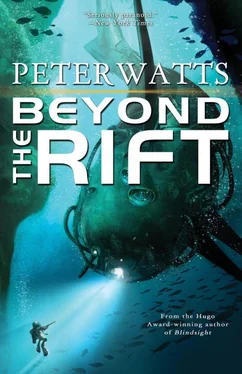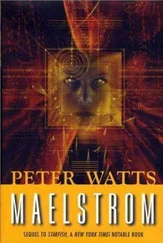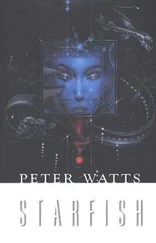It’s the simplest, most irreducible insight that biomass can have. The more you can change, the more you can adapt. Adaptation is fitness, adaptation is survival . It’s deeper than intelligence, deeper than tissue; it is cellular , it is axiomatic. And more, it is pleasurable . To take communion is to experience the sheer sensual delight of bettering the cosmos.
And yet, even trapped in these maladapted skins, this world doesn’t want to change.
At first I thought it might simply be starving, that these icy wastes didn’t provide enough energy for routine shapeshifting. Or perhaps this was some kind of laboratory: an anomalous corner of the world, pinched off and frozen into these freakish shapes as part of some arcane experiment on monomorphism in extreme environments. After the autopsy I wondered if the world had simply forgotten how to change: unable to touch the tissues the soul could not sculpt them, and time and stress and sheer chronic starvation had erased the memory that it ever could.
But there were too many mysteries, too many contradictions. Why these particular shapes, so badly suited to their environment? If the soul was cut off from the flesh, what held the flesh together?
And how could these skins be so empty when I moved in?
I’m used to finding intelligence everywhere, winding through every part of every offshoot. But there was nothing to grab onto in the mindless biomass of this world: just conduits, carrying orders and input. I took communion, when it wasn’t offered; the skins I chose struggled and succumbed; my fibrils infiltrated the wet electricity of organic systems everywhere. I saw through eyes that weren’t yet quite mine, commandeered motor nerves to move limbs still built of alien protein. I wore these skins as I’ve worn countless others, took the controls and left the assimilation of individual cells to follow at its own pace.
But I could only wear the body. I could find no memories to absorb, no experiences, no comprehension. Survival depended on blending in, and it was not enough to merely look like this world. I had to act like it—and for the first time in living memory I did not know how.
Even more frighteningly, I didn’t have to. The skins I assimilated continued to move, all by themselves . They conversed and went about their appointed rounds. I could not understand it. I threaded further into limbs and viscera with each passing moment, alert for signs of the original owner. I could find no networks but mine.
Of course, it could have been much worse. I could have lost it all, been reduced to a few cells with nothing but instinct and their own plasticity to guide them. I would have grown back eventually, reattained sentience, taken communion and regenerated an intellect vast as a world—but I would have been an orphan, amnesiac, with no sense of who I was. At least I’ve been spared that: I emerged from the crash with my identity intact, the templates of a thousand worlds still resonant in my flesh. I’ve retained not just the brute desire to survive, but the conviction that survival is meaningful . I can still feel joy, should there be sufficient cause.
And yet, how much more there used to be.
The wisdom of so many other worlds, lost. All that remains are fuzzy abstracts, half-memories of theorems and philosophies far too vast to fit into such an impoverished network. I could assimilate all the biomass of this place, rebuild body and soul to a million times the capacity of what crashed here—but as long as I am trapped at the bottom of this well, denied communion with my greater self, I will never recover that knowledge.
I’m such a pitiful fragment of what I was. Each lost cell takes a little of my intellect with it, and I have grown so very small. Where once I thought, now I merely react . How much of this could have been avoided, if I had only salvaged a little more biomass from the wreckage? How many options am I not seeing because my soul simply isn’t big enough to contain them?
The world spoke to itself, in the same way I do when my communications are simple enough to convey without somatic fusion. Even as dog I could pick up the basic signature morphemes—this offshoot was Windows , that one was Bennings , the two who’d left in their flying machine for parts unknown were Copper and MacReady —and I marveled that these bits and pieces stayed isolated one from another, held the same shapes for so long, that the labeling of individual aliquots of biomass actually served a useful purpose.
Later I hid within the bipeds themselves, and whatever else lurked in those haunted skins began to talk to me. It said that bipeds were called guys , or men , or assholes . It said that MacReady was sometimes called Mac . It said that this collection of structures was a camp .
It said that it was afraid, but maybe that was just me.
Empathy’s inevitable, of course. One can’t mimic the sparks and chemicals that motivate the flesh without also feeling them to some extent. But this was different. These intuitions flickered within me yet somehow hovered beyond reach. My skins wandered the halls and the cryptic symbols on every surface— Laundry Sched , Welcome to the Clubhouse , This Side Up —almost made a kind of sense. That circular artefact hanging on the wall was a clock ; it measured the passage of time. The world’s eyes flitted here and there, and I skimmed piecemeal nomenclature from its—from his —mind.
But I was only riding a searchlight. I saw what it illuminated but I couldn’t point it in any direction of my own choosing. I could eavesdrop, but I could not interrogate.
If only one of those searchlights had paused to dwell on its own evolution, on the trajectory that had brought it to this place. How differently things might have ended, had I only known . But instead it rested on a whole new word:
Autopsy .
MacReady and Copper had found part of me at the Norwegian camp: a rearguard offshoot, burned in the wake of my escape. They’d brought it back—charred, twisted, frozen in mid-transformation—and did not seem to know what it was.
I was being Palmer then, and Norris, and dog. I gathered around with the other biomass and watched as Copper cut me open and pulled out my insides. I watched as he dislodged something from behind my eyes: an organ of some kind.
It was malformed and incomplete, but its essentials were clear enough. It looked like a great wrinkled tumor, like cellular competition gone wild—as though the very processes that defined life had somehow turned against it instead. It was obscenely vascularized; it must have consumed oxygen and nutrients far out of proportion to its mass. I could not see how anything like that could even exist, how it could have reached that size without being outcompeted by more efficient morphologies.
Nor could I imagine what it did. But then I began to look with new eyes at these offshoots, these biped shapes my own cells had so scrupulously and unthinkingly copied when they reshaped me for this world. Unused to inventory—why catalog body parts that only turn into other things at the slightest provocation?—I really saw , for the first time, that swollen structure atop each body. So much larger than it should be: a bony hemisphere into which a million ganglionic interfaces could fit with room to spare. Every offshoot had one. Each piece of biomass carried one of these huge twisted clots of tissue.
I realized something else, too: the eyes, the ears of my dead skin had fed into this thing before its removal. A massive bundle of fibers ran along the skin’s longitudinal axis, right up the middle of the endoskeleton, leading directly into the dark sticky cavity where the growth had rested. That misshapen structure had been wired into the whole skin, like some kind of somatocognitive interface but vastly more massive. It was almost as if…
Читать дальше









